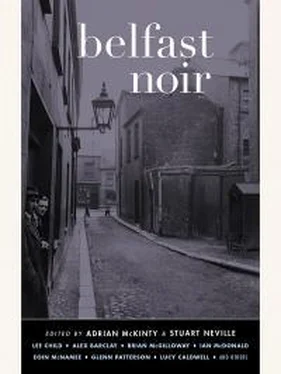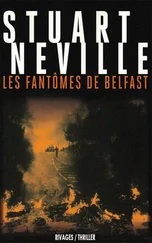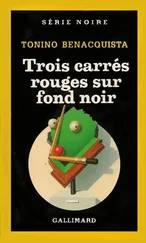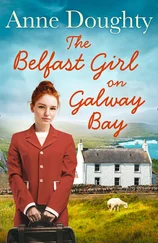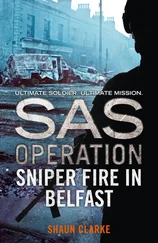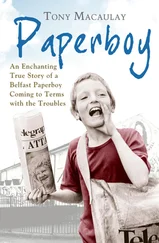“Mr. Healy,” Kirk said when he finally entered the room, “thanks for coming in. Mr. Hamill’s cremation is finished and, well, it was a little odd. There was a lot of ash, but no bone. And we found some unusual things on the magnet when we were done.”
Healy nodded. “I know.”
“Was Mr. Hamill the Bionic Man?” Kirk asked, handing Healy a small brown cardboard box.
“What?”
“You expect the odd metal plate. Implants and that. But I don’t think we’ve ever seen quite so many on one body. One of the staff thought we’d cremated RoboCop.” He chuckled softly, as if aware that too raucous a laugh would be inappropriate under the circumstances.
Healy opened the lid of the box. It was three-quarters full of black pieces of metal of various shapes and sizes, including springs and pins. But there was nothing traditionally gun-shaped.
“So, what are they?”
Healy swallowed dryly. “Surgical implants,” he said. “Mr. Hamill was a base jumper in his spare time. A lot of broken bones and joints, apparently.”
“So broken there were none left after the cremation?”
Healy shrugged. “I couldn’t tell you.”
Kirk nodded. “I see. He mustn’t have been very good.”
“What?”
“As a base jumper. His ashes are here, if you want to take those too. Though the urn is only half full.”
Healy peered down at the scraps of metal. He couldn’t understand how the guns had ended up in pieces, the confusion countered by the relief he felt that they could no longer be used for their original purpose.
Kirk came into the room with a small plastic box of ashes that, absurdly, reminded Healy of the Tupperware container Laura had used for his lunch.
“Thanks,” Healy said, heading for the door.
“I didn’t know they did surgical implants,” Kirk said, as he passed.
“Who?” Healy turned, stared at him, desperate to get away.
“Glock. The company that make the plastic pistols.”
“Apparently so,” Healy replied, his mouth dry.
“It’s the strangest cremation we’ve done in some time, I have to tell you,” Kirk said, openly irritated now at Healy’s circumspection.
“I wouldn’t think of it as a cremation so much as a . . . decommissioning . . . And an undertaking remarkably well done at that,” Healy added, then pushed out through the door into the weakening winter sun.
POISON
BY LUCY CALDWELL
Dundonald
I saw him last night. He was with a girl half his age, more than half, a third his age. It was in the bar of the Merchant Hotel on Skipper Street. They were together on the crushed-velvet raspberry banquette. Her arm was flung around his shoulder, and he had an arm around her too, an easy hand on her waist. She was laughing, her face turned right up to his, enthralled, delighted. They kept clinking glasses: practically every time they took a sip of their cocktails they clinked glasses. I was alone, on a stool at the bar, waiting for my friends—friends I hadn’t seen in years, but who, even years ago, were always late. I’d ordered a glass of white wine while I waited; I picked it up with shaking hands. It was him . There was no doubt about it. His face had got pouchy, and his hair, though still black—dyed, surely—was limp and thinning. When he stood up, he was shorter than I remembered.
But it was him.
I hadn’t seen him in years. I scrambled to work out the numbers in my head. Sixteen—seventeen—almost eighteen. All those years later and there he was, entwined with a girl a fraction of his age. He must be nearly sixty now.
I bent my head over the cocktail list as he walked toward me, letting my hair fall partly over my face, but I couldn’t take my eyes off him. His eyes slid over the women he passed, thin, fake-tanned bare backs and sequinned dresses, stripper shoes. He didn’t look once at me. I’d lived away too long, and I’d forgotten how dressed-up people got on a Saturday night: I was in skinny jeans and a blazer, and not enough makeup. I watched him walk along the striped carpet and out toward the toilets, and then I turned to look at his companion. She had her head bowed over her phone and she was jiggling one leg and rapidly texting. She suddenly looked very young indeed. I’d put her in her midtwenties but it was less than that. I felt a strange tightness in my chest. She put her phone away and uncrossed her legs, recrossed them, tugged at the hem of her little black dress. She picked up her empty glass and tilted her head right back and drained the dregs, coughed a little, set the glass back down, and slung her hair over the other shoulder. She had too much makeup on: huge swipes of blusher, exaggerated cat eyes. She glanced around the bar, then took out her phone again, flicked and tapped at it. She wasn’t used to being alone in a bar like this. It was an older crowd and she felt self-conscious, you could tell. The men in the chairs opposite her were in their forties at least, heavy-jowled, sweating in their suits, tipping back their whiskey sours. I watched the relief on her face when he appeared again, how she wriggled into him and kissed him on the cheek. As they studied the menu together, giggling, their heads bent confidentially together, I suddenly realised she wasn’t his lover.
She was his daughter.
She was Melissa. Seventeen years. She’d be eighteen now. Perhaps they were out tonight celebrating her eighteenth birthday.
With a surge of nausea I realised, then, that what I’d been feeling wasn’t outrage that she was too young for him, or contempt, or disgust. It was simpler, and much more complicated than that.
* * *
I don’t remember whose idea it was to go to Mr. Knox’s house. One minute we were giggling over him, nudging elbows and sugar-breath and damp heads bent together, and the next minute someone was saying they knew where he lived, something about a neighbour and church and his wife, and suddenly, almost without the decision being made at all, it was decided that we were going there.
Was it Tanya?
There were four of us: Donna, Tanya, Lisa, and me. We were fourteen, and bored. It was a Baker day, which meant no school, and we had nothing else to do. It was April, and chilly; rain coming in gusty, intermittent bursts. The Easter holidays had only just ended, and none of us had any pocket money left. We’d met in Cairnburn Park just after nine, but at that time on a wet Monday morning it was deserted. We’d wandered down to the kiddie playground but the swings were soaking and after a half-hearted couple of turns on the roundabout we’d given up. The four of us had trailed down Sydenham Avenue and past our school—it was strange to see the lights on in the main building, and the teachers’ cars all lined up as usual. Then, more out of habit than anything else, we crossed the road to the mini-market. We pooled our spare change to buy packets of strawberry bonbons and bags of Midget Gems and Donna nicked a handful of fizzy cola bottles. We ate them as we trudged on down toward Ballyhackamore. The rain was getting heavier and none of us had umbrellas, so we’d ended up in KFC, huddled over the melamine table, slurping a shared Pepsi. We were the only ones in there. The sugar and the rain and the boredom made us restless, and snide. We’d started telling stories, in deliberately too-loud voices, about people we knew who’d ordered plain chicken burgers and complained when they came with mayo. There’s no mayo in it, the person behind the counter would say. Oh yes there is. Oh no there isn’t. And it would turn out that the mayo was actually a burst sac of pus from a cyst growing on the chicken breast. The girl behind the counter was giving us increasingly dirty looks and we realised that if she chucked us out we really had nowhere to go; so we changed tack then and started slagging each other, boys we’d fancied, boys we’d “seen,” or wanted to “see,” as the expression went.
Читать дальше
